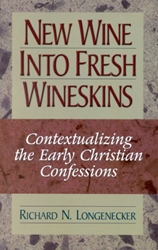 New
Wine into Fresh Wineskins:
New
Wine into Fresh Wineskins: Contextualizing the Early Christian Confessions
by Richard N. Longenecker
Peabody, MA: Hendrickson, 1999. Pp. x + 207. $14.95 (paper).
 New
Wine into Fresh Wineskins:
New
Wine into Fresh Wineskins:
Contextualizing the Early Christian Confessions
by Richard N. Longenecker
Peabody, MA: Hendrickson, 1999. Pp. x + 207. $14.95 (paper).
Published in TS 62.2 (2001) 421.
Reviewed by Felix Just, S.J., Ph.D., Los Angeles,
CA 90045
"New wine" ("the proclamation of the kingdom of God as focused in the teaching and work of Jesus") always requires "fresh wineskins" ("the forms into which this proclamation was cast in the NT and the diverse contexts into which it needs to be cast today"; ix-x). Instead of investigating the teachings and actions of Jesus, however, Longenecker focuses on the early Christian proclamations about Jesus, especially the core "confessions" ("formulaic statements that express the essential convictions of the earliest believers in Jesus"; 24).
Since others have studied the NT confessional materials extensively, Longenecker identifies and lists them fairly briefly. Subdividing them into three familiar categories (hymns, formulaic prose passages, and single-statement affirmations), he helpfully lists the form-critical criteria used to identify them and summarizes their nine major themes. Going through the NT book-by-book, he then shows how each biblical author contextualized the confessions for various theological and ethical purposes. Although his exegetical analysis is good, some of his claims are fairly general while others are somewhat repetitive. Potentially misleading is his use of quotation marks around his own formulations ("Jesus is humanityís redemptive Lord," 84), even if they are not direct quotations from the NT.
Longeneckerís most valuable contribution is in Part III, which presents seven theoretical "Models of an Understanding of Contexualization" (transferal, translation, anthropological, ethnological, transcendental, semiotic, and especially his own "synergistic-developmental model"), and concludes with some excellent suggestions for a contemporary "Incarnational and Contextualized Theology" (154-73). He gives some illuminating examples (in worship, preaching, doctrine, and ethics) of challenges that arise when the Bible encounters non-Western cultures, although surprisingly many of his examples here are from OT texts and non-confessional NT passages (e.g., the Lordís Prayer).
Longenecker has clearly shown the need for ongoing "contextualization" of the Christian proclamation in new eras and cultures, but since this book is somewhat abstract and theoretical, it will be useful more for missiologists and academic theologians than for general readers.
Return to the Curriculum Vitae or the Homepage of Felix Just, S.J.
This page was last updated on May 18, 2005